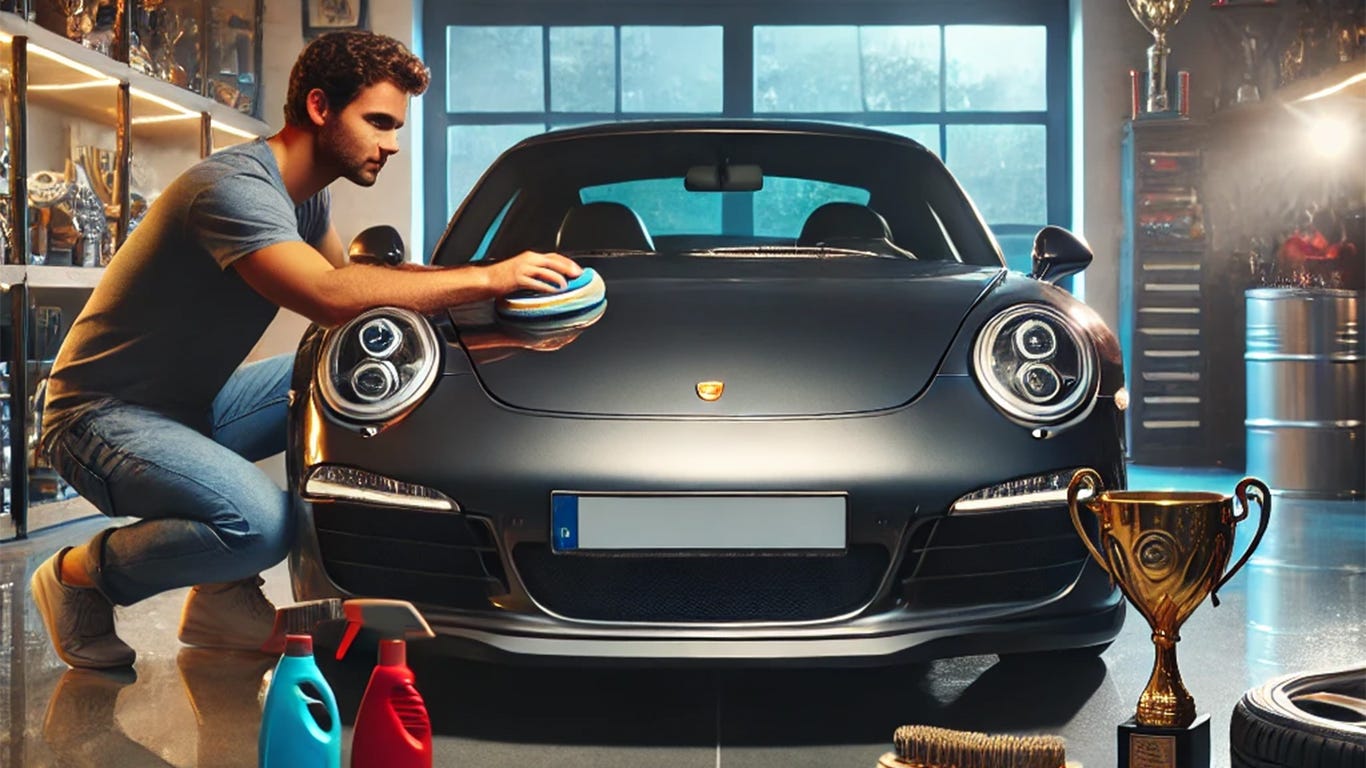Rev Up Without Regret: Understanding Mileage and Sports Car Depreciation
Enjoy the Ride Without Worrying About Resale Values
Ah, the age-old conundrum: to drive or not to drive? Many sports car owners treat their vehicles like delicate museum pieces, fearing that every additional mile will send their car's value plummeting faster than a lead foot on an open highway. Or, they are among many generous owners (sarcasm) saving the car for the next owner. But is this mileage-phobia truly justified? What are some of the reasons behind this mileage fear? Let’s get in to it.
The Depreciation Dance: Mileage vs. Value
It's no secret that most all cars lose value over time—a process as inevitable as hitting a red light when you're in a hurry. However, the relationship between mileage and depreciation isn't as straightforward as a straightaway on the Autobahn. While it's true that higher mileage can impact a car's resale value, the extent varies, especially for high-end sports cars.
For instance, the Porsche 911, a darling of the sports car world, boasts an average depreciation of just 14.6% over five years.
This suggests that factors beyond mileage, such as brand reputation and demand, play significant roles in value retention.
While it's tempting to keep your high-end sports car tucked away to preserve its pristine condition, extended periods of inactivity can lead to several issues:
Battery Drain: Without regular use, the car's battery can lose its charge, especially with modern vehicles that have numerous electronic systems consuming power even when off. If you plan not to drive your sports car for 2+ weeks, it is best to place it on a trickle charger.
Fluid Degradation: Engine oil, brake fluid, and other lubricants can deteriorate over time, reducing their effectiveness and potentially leading to component wear.
Tire Deformation: Prolonged stationary periods can cause flat spots on tires, affecting ride quality and safety. To minimize you can overinflate your tires ( to the max pressure recommended by manufacturer) prior to storage; use tire cradles or flat-stoppers (see www.raceramps.com )
Brake Issues: Lack of use can lead to rust on brake rotors, which can cause noise and reduced braking efficiency.
Seal and Gasket Drying: Without regular lubrication from fluids, seals and gaskets can dry out, leading to leaks. This can become an expense fix.
Fuel System Problems: Stagnant fuel can degrade, leading to potential clogs in the fuel system.
Regularly driving your sports car helps maintain its performance and prevents these issues. Even periodic short drives can keep components in good working order.
Mileage Milestones: When Do the Wheels Fall Off?
Many owners fret over specific mileage thresholds, fearing their car's value will nosedive once they cross them. While certain mileage milestones can influence depreciation, their impact isn't as catastrophic as some might think.
An easy broad-brush way to calculate a car's loss of value is to use 20,000-mile bands: every time your car goes through one of these bands, it loses about 20% of its value.
However, this is a very rough estimate, and actual depreciation can vary based on factors like make, model, and overall condition.
Since most high-end sports car owners would never even reach 20,000 miles on a from-new sports car, I think there is not much cause for concern.
The Bigger Picture: More Than Just Miles
While mileage is a factor in depreciation, it's not the sole determinant. Vehicle condition, maintenance history, and market demand often weigh more heavily. A well-maintained sports car with higher mileage can retain value better than a low-mileage counterpart that's been neglected.
Moreover, some sports cars are notorious for rapid depreciation regardless of mileage. For example, the Maserati Ghibli is known to depreciate significantly after just three years of ownership.
There are several reasons why high-end sports car owners hesitate to drive their cars, and while some may seem practical, others are deeply rooted in perception, psychology, or even superstition. Here are some of the most common reasons:
1. Collectability & Future Value:
Some cars, particularly limited-production models from brands like Ferrari, Porsche, and McLaren, are seen as investments. Owners believe that keeping the car’s mileage low and in pristine condition will result in a higher return when they eventually sell it. This is especially true for models that could become classics in the future. In the meantime, other than applying detail spray every now and then are they truly enjoying? Who am I to judge. Do you.
2. Available Time:
Enthusiasts that just don’t have the time to drive their cars. Whether that is due to businesses they run, travel, or other commitments there just aren’t enough hours on the weekend to drive a lot of miles. Although, I know several that will make it a point to drive their car every month to ensure all is in working order.
3. Depreciation Fear:
For many owners, the biggest concern is that every mile driven reduces the car’s value. Especially in the exotic and collector market, lower mileage often equates to higher resale prices. The belief is that once a car crosses a certain mileage threshold (e.g., 5,000, 10,000, or 20,000 miles), its value drops significantly.
4. Maintenance & Repair Costs:
Unlike regular cars, high-performance vehicles often require specialized maintenance, which can be expensive. Some owners avoid driving their cars frequently to delay major service intervals. True that. The McLaren I owned was an expensive one to maintain.
5. Insurance Costs:
Insurance rates for exotic sports cars are already high, but frequent driving can increase premiums. Some owners choose to keep mileage low to maintain lower insurance costs, particularly if they are on limited-use or collector car policies.
6. Road Conditions & Damage Risk:
Many owners fear rock chips, potholes, road debris, or careless drivers. They’d rather not risk scratches, dents, or windshield damage that could require costly repairs or diminish the car’s resale value.
7. Visibility & Unwanted Attention:
Driving a Ferrari, Lamborghini, or McLaren tends to attract a lot of attention—some positive, some negative. Owners may avoid driving their cars to prevent unwanted stares, social media posts, or even reckless behavior from other drivers trying to race them. Many owners prefer to remain anonymous.
8. Limited Practicality
Many high-end sports cars have stiff suspensions, low ground clearance, and minimal storage space, making them inconvenient for daily use. Speed bumps, steep driveways, and tight parking spaces can be a nightmare.
9. Fear of Accidents & Repairs
A fender bender in a Toyota Camry is one thing; a minor accident in a Ferrari could mean tens of thousands in repairs and diminished resale value. Some owners keep their cars tucked away to avoid any risk of damage. More carbon fiber panels on sports cars is also adding to the cost of insurance and repairs.
10. Seasonal Use & Weather Conditions
Many sports cars are stored during winter months to avoid snow, ice, and road salt, which can damage paint and mechanical components. Even in warm climates, owners may avoid driving in the rain due to traction concerns or simply to keep the car clean.
11. Psychological & Emotional Attachment
Some owners view their cars more as works of art than machines meant to be driven. They take pride in the ownership and presentation rather than the driving experience itself.
12. Keeping It "New" for the Next Owner
This one is particularly ironic. Owners hesitate to drive their cars too much because they want to keep them in pristine condition for resale, essentially preserving the car for the next owner rather than themselves.
13. Status Symbol vs. Driving Enthusiasm
For some, owning an exotic car is more about the prestige of having one than the actual driving experience. The car sits in a garage as a trophy rather than being used as intended. Cars and Coffee is a great place to locate these owners.
Conclusion: Drive the Dream
In the grand prix of life, owning a sports car isn't just about preserving its value—it's about the exhilaration of the drive, the symphony of the engine and the envious glances at stoplights. While being mindful of mileage can have some impact on resale value, obsessing over it shouldn't keep you from enjoying your automotive masterpiece. After all, cars are meant to be driven, not just detailed. Of course, this is just a matter of someone’s point of view. You do what works for you and I will drive my cars…. Miles = Smiles!
Poll: Do You Suffer from Mileage-Phobia?
Be honest—what’s really keeping you from driving your sports car? Just having some fun here, relax.






